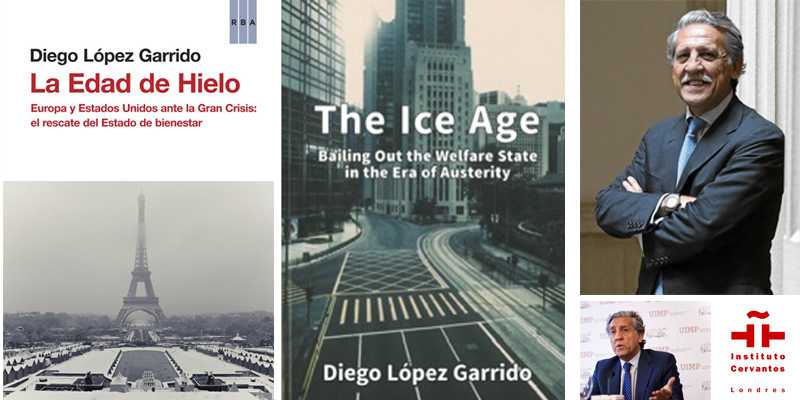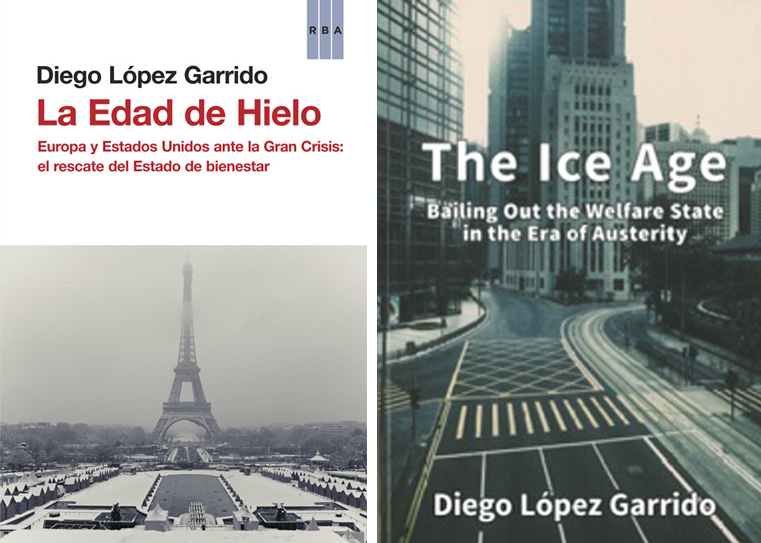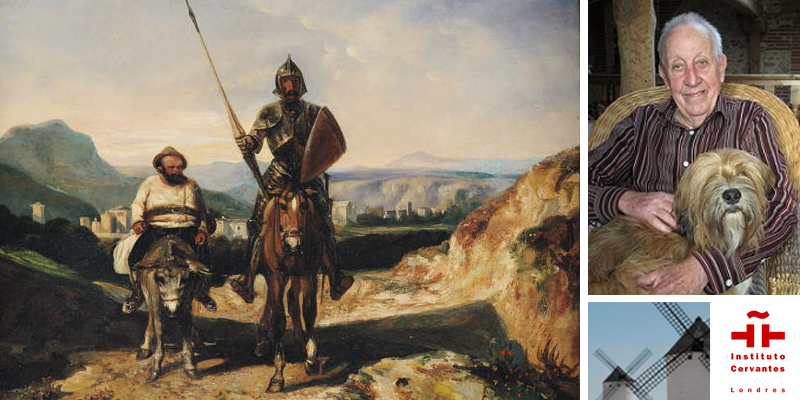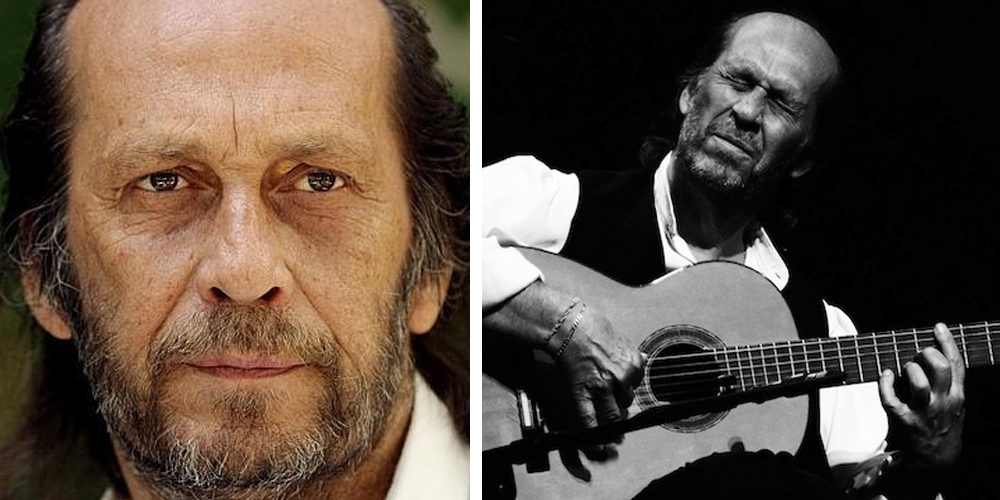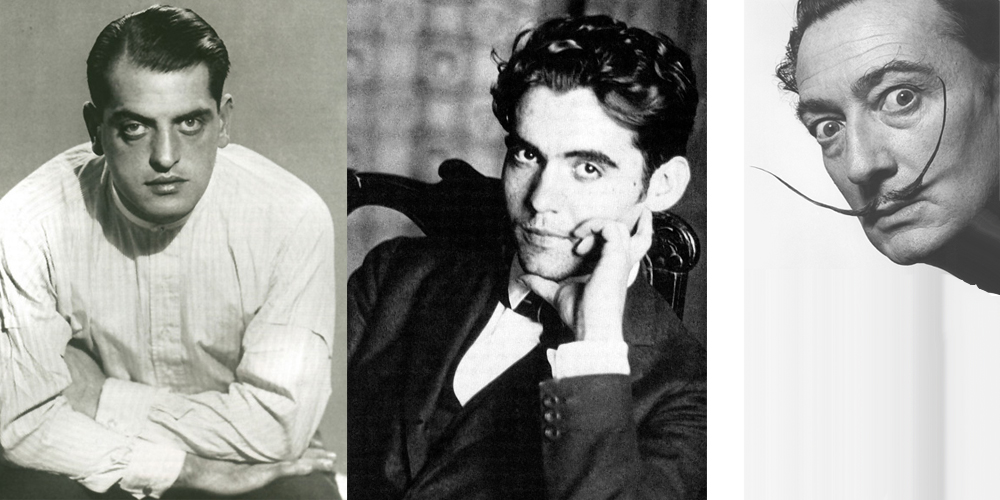Debate sobre política y ciencia en España en la primera mitad del s. XX / A roundtable about science and policy in Spain during early 20th Century
|
- La Embajada de España en Londres organiza la mesa redonda “Science Policy in the 20th-Century in Spain, Italy and Argentina” como celebración del lanzamiento del libro “Science Policies and Twentieth Century Dictatorships” el próximo 4 de febrero.
- El libro es fruto de la colaboración entre científicos británicos y españoles. Cuatro de los autores presentarán sus estudios sobre cómo se relaciona la comunidad científica con los gobiernos en tiempos de democracia y de dictadura.
La mesa redonda “Science Policy in the 20th-Century in Spain, Italy and Argentina” contará con las intervenciones del catedrático de Estudios de Política Científica Brian Balmer de la University College London, la catedrática de Lógica y Filosofía de la Ciencia Amparo Gómez-Rodríguez y el profesor de Historia de la Educación Antonio Canales-Serrano, ambos de la Universidad de La Laguna, así como con el profesor de Historia de la Ciencia Francisco González Redondo de la Universidad Complutense de Madrid.
Los ponentes tratarán las políticas científicas de tres países (España, Italia y Argentina) que experimentaron una considerable agitación política durante la primera mitad del siglo XX. Se prestará especial atención a España, por una parte, por ser uno de los primeros países en aplicar el “contrato social para la ciencia” durante los años que constituyeron la Edad de Plata de la cultura española, por la convergencia con Europa tras décadas de decadencia y aislamiento; y, por otra parte, por el impacto que la Guerra Civil española tuvo en el sistema científico y en su posterior reconstrucción.
Este evento es el primer acto científico del programa “Ciencia en la Embajada” organizado por la Oficina para asuntos culturales y científicos de la Embajada de España en Londres y la Fundación Española para la Ciencia y la Tecnología (FECYT). El acto cuenta con la participación del Instituto Cervantes, el departamento de Science and Technology Studies de University College London, la Sociedad de Científicos Españoles en el Reino Unido (SRUK/CERU) y la UCLU Spanish & Latin American Society.
Fecha y hora: 4 de febrero de 2016, 6:30pm.
Lugar: Instituto Cervantes, 102 Eaton Square, London SW1W 9AN
Registration online: http://spanishembassy-sciencepolicybook.eventbrite.co.uk
_____________________________________________________________________
| PRESS RELEASE |
- The Spanish Embassy in London organises the roundtable “Science Policy in the 20th Century in Spain, Italy and Argentina” to celebrate the launch of the book “Science Policies and Twentieth Century Dictatorships”, on 4th
- The book is a result of collaboration between British and Spanish scientists. Four of the authors will show their studies about the relationships between scientific communities and governments during times of democracy and dictatorships.
Four scientists will participate in the roundtable “Science Policy in the 20th Century in Spain, Italy and Argentina”: Prof Brian Balmer, Professor in Science Policy Studies in University College London (UCL); Prof Amparo Gómez-Rodríguez, Professor in Logic and Phylosophy of Science, and Dr Antonio Canales-Serrano, Lecturer in History of Education, both from Universidad de La Laguna; and Dr Francisco A González-Redondo, Senior Lecturer in History of Science in Universidad Complutense de Madrid.
Talks will delve in science policies in three countries—Spain, Italy and Argentina—that each experienced considerable political upheaval in the 20th Century. Special attention will be placed in Spain, because it was one of the first countries to successfully apply the so-called ‘social contract’ for science, a concept similar to the Haldane Principle in the UK, during the first half of the 20th Century. The Spanish convergence with Europe, after decades of isolation and decline, embodied the Silver Age for Spain. However, the Spanish Civil War would have a significant impact on the science system and its subsequent rebuilding.
This is the first event of the scientific programme “Science at the Embassy” organized by the Office for Cultural and Scientific Affairs of the Spanish Embassy in London and the Spanish Foundation for Science and Technology (FECYT). It also has the collaboration of Instituto Cervantes, the Department of Science and Technology Studies from UCL, the Society of Spanish Researchers in the United Kingdom (SRUK/CERU) and UCLU Spanish & Latin American Society.
When: 4th February 2016, 6:30pm.
Where: Instituto Cervantes, 102 Eaton Square, London SW1W 9AN
Registration online: http://spanishembassy-sciencepolicybook.eventbrite.co.uk
Esta semana en el Instituto Cervantes de Londres / The Week At The Instituto Cervantes London
Este jueves 4 a las 18:30h, lanzamiento de libro sobre la política científica en España en el sXX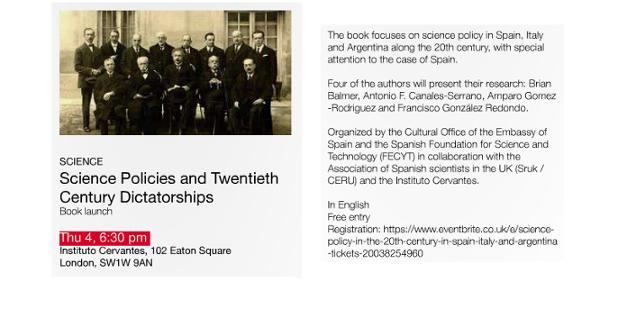
_______________________________________________________________
This coming Thursday 4th at 6:30 pm, we will be hosting a book launch with a focus on science and politics in Spain during the early XX century.
Esta semana en el Instituto Cervantes / The Week At The Instituto Cervantes
lunes 25 de enero 2016
Primer día del curso crash de español presencial (1 semana de duración)
______________________________
Primer día del curso intensivo de español presencial (2 semanas de duración)
______________________________
Primer día del curso de español en línea con apoyo de tutor (aprendizaje flexible, 20 semanas de duración)
________________________________________________________________
jueves 28 y viernes 29 de enero 2016
Simposio anglohispano sobre Cervantes y Shakespeare en la universidad de Oxford – programa completo aquí.

________________________________________________________________
jueves 28 de enero 2016 / sábado 30 de enero 2016
A partir de hoy comienzan los cursos de preparación para los exámenes DELE
_____________________________________________________________________
_____________________________________________________________________
Monday 25 January 2016
First day of the 1-week long Spanish crash course
______________________________
First day of the 2-week long Spanish intensive course
______________________________
First day of the online Spanish course with tutor support (flexible learning, 20 weeks)
________________________________________________________________
Thursday 28 and Friday 29 January 2016
Spanish-English symposium about Cervantes and Shakespeare at the University of Oxford – full programme here.

________________________________________________________________
Thursday 28 January 2016 / Saturday 30 January 2016
La semana en el Instituto Cervantes / The week at the Instituto Cervantes
¿Qué hay de nuevo en nuestro centro esta semana? Aquí tienes un resumen:
LUNES 18 de enero 2016
Desde hoy y hasta el jueves 21, comienzan los últimos cursos generales de español de este trimestre. ¡No pierdas la oportunidad de comenzar uno!
________________
Comienza el curso de traducción directa e inversa ES-EN, para niveles avanzados y hablantes nativos de español.
_______________
Comienza el curso semiintensivo de español, nivel inicial
________________________________________________________________
MARTES 19 de enero 2016
Desde hoy y hasta el jueves 21, comienzan los cursos de preparación para los niveles GCSEs, A2 y AS
Comienza el curso de conversación general (turno martes) para el nivel B2.
_______________
Comienza el curso de español e historia (niveles B2 y C1) – mejora tu español leyendo y comentando épocas de la historia de España
_______________
Comienza el curso «descubre Latinoamérica» (niveles B2 y C1) – mejora tu español hablando y aprendiendo sobre las culturas hispanas del centro y sur de América
________________________________________________________________
MIÉRCOLES 20 de enero 2016
Hoy y mañana comienzan los dos turnos del curso de español y literatura para niveles B2 y C1 – mejora tu español leyendo, escribiendo y discutiendo literatura
________________________________________________________________
JUEVES 21 de enero 2016
Comienza el curso de conversación general (turno jueves) para niveles intermedio (B1) y avanzado (B2).
_______________
Comienza el curso de pronunciación para niveles avanzados (B2, C1)
_______________
Diego López Garrido presenta «La Edad de Hielo», su libro sobre la crisis económica en Europa
_______________
Taller «cómo buscar trabajo de profesor ELE en Londres»
________________________________________________________________
VIERNES 22 de enero 2016
Hoy y mañana comienzan los dos turnos del curso de gramática para profesores de español
_______________
¿Quieres echarle un vistazo a nuestra oferta con más tranquilidad? Tienes a tu disposición el calendario académico completo del trimestre enero-marzo 2016 aquí, y el programa de cultura del mes de enero aquí.
_____________________________________________________________
_____________________________________________________________
What is happening at our centre this week? Here is a summary:
MONDAY 18 January 2016
Today through Thursday 21 January, we will see the last few general Spanish courses of this quarter start. Take this opportunity to join one; full calendar available here.
________________
First day of the ES-EN direct and reverse translation course, aimed at advanced levels and native speakers of Spanish
_______________
First day of the semi-intensive Spanish course for A levels
________________________________________________________________
TUESDAY 19 January 2016
Today, tomorrow and Thursday start all three GCSE, AS and A2 levels preparation courses
First day of the General Spanish Conversation course (Tuesday shift) for level B2.
_______________
First day of the Spanish and History course (levels B2 and C1) – improve your Spanish reading and discussing Spanish history
_______________
First day of the Discover Latin America course (levels B2 and C1) – improve your Spanish by listening to others’ views of Hispanic cultures in Central and South America and sharing your own
________________________________________________________________
WEDNESDAY 20 January 2016
Both shifts of the Spanish and Literature course (levels B2 and C1) start today and tomorrow – improve your Spanish reading, writing and discussing literature in Spanish
________________________________________________________________
THURSDAY 21 January 2016
First day of the General Conversation course (Thursday shift) for levels B1 and B2
_______________
First day of the Pronunciation course for higher levels (B2 and C1)
_______________
Diego López Garrido presents his latest book The Ice Age, about the European crisis
_______________
Workshop: How To Look For Work As A Spanish ELE Teacher In London
________________________________________________________________
FRIDAY 22 January 2016
Both shifts of the Grammar course for teachers start today and tomorrow
_______________
Would you like to put some more thought into our offer for the quarter? Our entire winter course catalogue is available here, and our January events are listed here.
«La Edad de Hielo», el rescate del estado de bienestar – The Ice Age, Bailing Out the Welfare State
Esta semana en el Instituto Cervantes / The week at the Instituto Cervantes
Qué pasa en el Instituto Cervantes de Londres la semana del 11 al 17 de enero de 2016:
LUNES 11 de enero 2016
Desde hoy y hasta el domingo 17 de enero, comienzan todos los cursos trimestrales generales de español, niveles A1-C2. ¿Por qué no hacer uno? Consulta el calendario completo aquí.
_______________
Fecha límite para matricularse en el curso para preparadores y examinadores DELE A1 y A2
_______________
Comienza el curso semiintensivo de español para niveles inicial y elemental
_______________
Comienza el curso a distancia para preparadores y examinadores DELE escolar A2 / B1
________________________________________________________________
MARTES 12 de enero 2016
Presentación de «The Spanish Trilogy», volumen recopilatorio de las novelas de Robin Chapman inspiradas en Don Quijote.
________________________________________________________________
VIERNES 15 de enero 2016
Revisión de español nivel avanzado B2
________________________________________________________________
SÁBADO 16 de enero 2016
Comienza el curso de perfeccionamiento de español, nivel C2
_______________
Comienza el curso de español general para negocios
_______________
Comienza el curso de conversación general en español para nivel B2
_____________________________________________________________
_____________________________________________________________
What is going on at the Instituto Cervantes in London the week of 11-17 January 2016:
MONDAY 11 January 2016
All our quarterly general Spanish courses, levels A1-C2, start on different days throughout this week. Why not join one? Full calendar available here.
_______________
Deadline to enrol in the online course for DELE A1 and A2 examiners
_______________
First day of the semi-intensive Spanish course for complete beginners and beginners
_______________
First day of the online course for DELE examiners A2 / B1 for children and young people
________________________________________________________________
TUESDAY 12 January 2016
Launch of «The Spanish Trilogy», which brings together Robin Chapman’s novels inspired by Don Quijote
________________________________________________________________
FRIDAY 15 January 2016
First day of the Advanced Spanish (B2) reviewing course
________________________________________________________________
SATURDAY 16 January 2016
First day of the Spanish Proficiency course (C2)
_______________
First day of the General Business Spanish course
_______________
First day of the General Conversation in Spanish course, level B2
Presentación de «The Spanish Trilogy», de Robin Chapman / Book Launch: The Spanish Trilogy by Robin Chapman
Leyendo: Timothy West
Moderador: Harry Chapman
Comenzamos la conmemoración del cuarto centenario del fallecimiento de Cervantes con la presentación de este volumen, publicado por Book Now, que reúne por primera vez las tres novelas que el autor británico Robin Chapman escribió inspirándose en el Quijote.
«El diario de la duquesa» cuenta cómo María Isabel de Echauri, la duquesa de Caparroso, llega a creer que su personaje ha sido mal representado en un trabajo de ficción, y va adentrándose en uno de los campos favoritos de Cervantes: el diálogo entre la realidad y la ficción. «La edad dorada de Sancho» detalla cómo Sancho Panza, tras la muerte de Don Quijote, intenta hacer realidad el concepto de existencia que los dos imaginaron en su último viaje a casa. Por otra parte, «La vida de Pasamonte» desarrolla la autobiografía de un granuja, comenzada pero dejada a medio hacer cuando Don Quijote lo libera de un grupo de engrilletados.
Robin Chapman es novelista, guionista y dramaturgo. Está casado con la artista Jill Booty. Su último trabajo, «El Don Quijote de Shakespeare» (Book Now, 2011), es una novela dialogada que resucita a Cardenio, una obra perdida de William Shakespeare basada en Don Quijote. La obra se representa en un teatro marginal frente a los espíritus parlanchines de Cervantes y Shakespeare, que descubren que tienen mucho en común.
El autor británico se encuentra escribiendo «El joven rojo», un retrato literario de J. B. Trend, el primer profesor de español en la universidad de Cambridge, amigo a su vez de Lorca y Falla.
Dónde:
Instituto Cervantes de Londres – Auditorio
102 Eaton Square, London SW1W 9AN
Cuándo:
Martes 12 de enero 2016, 18:30h
En inglés – entrada libre
Confirmación de asistencia requerida en reservas.londres@cervantes.es
____________________________________________________
Reading: Timothy West
Moderator: Harry Chapman
We start the celebrations of the fourth centenary of Cervantes’s death with the launch of this volume, published by Book Now, which brings together for the first time Robin Chapman’s three novels inspired by Don Quixote.
The Duchess’s Diary tells how Maria Isabel de Echauri, Duchess of Caparroso, comes to believe that she has been misportrayed in fiction, thus approaching one of Cervantes’s favorite themes, the dialogue between reality and fiction. Sancho’s Golden Age relates how Sancho Panza, after Don Quixote’s death, tries to create an ideal pastoral existence such as they had envisaged on their final journey home. Pasamonte’s Life extends a rogue’s auto biography already in progress but left in pawn when Don Quixote releases him from a chain-gang.
Robin Chapman is a novelist, playwright and screenwriter. He is married to the painter Jill Booty. His most recent book, Shakespeare’s Don Quixote, Book Now 2011, is a novel in dialogue which reconstructs Cardenio, a lost Shakespearean play based on Don Quixote. He imagines it performed in a fringe theatre in front of the talkative spirits of Cervantes and Shakespeare. They find they have much in common. He is at present working on That Red Young Man, a literary portrait of J.B. Trend, the first Professor of Spanish at Cambridge University and friend of Lorca and Falla.
Where:
Instituto Cervantes London Auditorium
102 Eaton Square, London SW1W 9AN
When:
Tuesday 12 January 2016, 6:30pm
In English – Free entry
RSVP reservas.londres@cervantes.es
Trevor Dadson cierra el ciclo «Grandes hispanistas británicos» / Trevor Dadson Closes The Great British Hispanists Series
En la esperada ponencia de clausura del ciclo «Grandes hispanistas británicos» celebrado en nuestro auditorio a lo largo del año, Trevor Dadson y nuestro director Julio Crespo MacLennan han hablado de historia, literatura y sociedad, y han puesto atención en una época clave en la historia de España: la de la expulsión de los moriscos en los sXV y XVI.
«¿Hubo realmente expulsión?» ha sido la pregunta que ha dado paso a una conversación eléctrica, en la que el profesor Dadson ha desvelado información inédita, sospechada por algunos aunque para muchos desconocida, arrojando nueva luz sobre los elementos históricos que han moldeado la cultura de la España actual.
__________________________
Throughout the long-awaited Great British Hispanists Series closing interview, Trevor Dadson and our Director Julio Crespo MacLennan talked history, literature and society, and focused on a key period in Spanish history: the mass exile of the Moorish population in the XV and XVI centuries.
«Was there really an exile after all?» was the question that sparked an electrifying conversation. As the evening progressed, Prof. Dadson unveiled some new pieces of information, suspected by some though unknown to many, which shed a new light on the historical elements that shaped the culture of contemporary Spain.
5 cosas que quizá no supieras sobre Paco de Lucía / 5 things you may not have known about Paco de Lucía
Paco de Lucía es uno de los músicos españoles más conocidos del mundo, y todavía es el primer nombre que viene a la mente cuando se habla de flamenco. Pero el artista gaditano es mucho más que flamenco; aquí 5 apuntes para que lo conozcas un poco mejor antes del concierto homenaje que se le dará este miércoles 9 de diciembre en Barbican:
- De madre portuguesa, su nombre completo era Francisco Sánchez Gomes. Como en su pueblo varios otros niños se llamaban Francisco (Paco) y tocaban la guitarra, pasó a ser Paco de Lucía (Paco, el de Lucía) para que se le pudiera distinguir de los demás.
- Igual que ocurriera en su momento con Wolfgang Amadeus Mozart, fue el padre de Paco de Lucía quien le encaminó hacia la música profesional desde los 5 años, siendo bastante estricto en la metodología de formación del muchacho y haciéndole practicar más de 5 horas diarias en las épocas intensas.
- Las primeras salidas al extranjero de Paco de Lucía le abrieron a nuevos géneros musicales y propiciaron su interés por otros ritmos, en especial el jazz.
- Fue el creador del llamado “nuevo flamenco”, que incorporaba elementos de otros géneros. Su contribución tuvo muchos detractores entre las filas del flamenco clásico.
- Paco de Lucía fue el primer abanderado comercial del flamenco en el mundo, y el responsable de que esta seña de identidad andaluza se propagara más allá de las fronteras españolas.
Aunque en 2004 redujo notablemente la frecuencia de sus apariciones públicas, ha seguido dando conciertos, especialmente en España y en Alemania, hasta unos meses antes de fallecer el 25 de febrero de 2014.
La comunidad de Barbican prepara un concierto homenaje a Paco de Lucía, este miércoles 9 de dicembre, con la actuación de algunos de los artistas que compartieron escenario y vida con el guitarrista flamenco, así como nombres relevantes en la escena musical internacional. Los detalles sobre el evento están disponibles en este enlace.
_______________________________
Paco de Lucia is one of the world’s most renowned Spanish musicians, and his is still the first name that comes to mind whenever the topic of flamenco is brought up. But the Cadiz region born artist is more than a simple flamenco guitarist; here are 5 details to get to know him a little better. before the Paco de Lucia tribute concert, this coming Wednesday 9 December at Barbican:
- Born to a Portuguese mother, his full name was Francisco Sanchez Gomes. Many other children in the small town where he lived were called Francisco (Paco) and played the guitar. He became Paco de Lucía (Paco, the son of Lucia) so that he could be told apart form the other kids.
- As it had happened with Wolfgang Amadeus Mozart back in the days, it was Paco de Lucia’s father who led the boy to the guitar at age 5. His father was quite strict in everything related to methodology, and the boy used to study up to and over 5 hours a day during intense times.
- The first few musical ventures abroad opened Paco de Lucia up to unheard of musical genres and fostered his interest in other rhythmic solutions, especially jazz.
- He was the creator of «new flamenco», a fusion of classic flamenco sounds with elements of other musical genres. His contribution to the genre had many detractors among the ranks of classic flamenco.
- Paco de Lucia was the first flamenco artist to make flamenco known and broadly available to listeners worldwide, and ultimately the first person responsible for taking this Andalusian signature sound beyond Spanish borders.
Although Paco de Lucia significantly reduced the frequency of his public appearances in 2004, he continued performing, especially in Spain and Germany, until a few months before his death on February 25, 2014.
The Barbican community prepares a tribute to Paco de Lucia this coming Wednesday 9 December, with performances by some of the artists who shared stage with the flamenco guitarist, as well as other leading names in the international music scene. Details about the event are available on this link.
Mesa redonda – Buñuel, Lorca, Dalí: cultura, biografía y legado / Open table discussion – Buñuel, Lorca, Dalí: Culture, Biography and Legacy
¿Cómo construir una vida por medio de una película? ¿Cómo influyó el sistema de valores de la Residencia de Estudiantes de Madrid -donde vivieran Luis Buñuel, Federico García Lorca y Salvador Dalí a principios de la década de 1920- en el trabajo de los tres artistas? Para sellar la temporada cinematográfica del ICA «Luis Buñuel: estética de lo irracional», reunimos a un grupo de expertos en cultura con el fin de analizar la relación particular de Lorca, Buñuel y Dalí, y la forma de la que artistas y directores de cine han intentado captar tanto la estética revolucionaria de los tres artistas como su valiosísimo legado cultural.
El actor Nickolas Grace (quien diera vida a Lorca en el largometraje de Bardem en 1995, «Lorca, muerte de un poeta»), los directores Mike Dibb (El espíritu de Lorca, BBC Arena 1986; La fama y humillación de de Salvador Dalí, BBC Arena 1996) y Pablo Romero (Universidad de Roahampton, actualmente inmerso en un nuevo proyecto sobre Las Hurdes de Buñuel junto con Dibb), y la académica y traductora Sarah Wright (Royal Holloway, University of London), se reúnen con María Delgado (Royal Central School of Speech and Drama, University of London) para hablar de la cultura, biografía y legado de Buñuel, Dalí y Lorca.
Dónde: Instituto Cervantes de Londres – 102 Eaton Square, London SW1W 9AN
Cuándo: miércoles 2 de diciembre 2015, 18:30h
______________________________________
What does it mean to construct a life through film? How did the unique ethos of Madrid’s Residencia de Estudiantes where Luis Buñuel, Federico García Lorca and Salvador Dalí all lived during the early 1920s influence the creative work of all three artists? To mark the ICA’s ‘Luis Buñuel: Aesthetics of the Irrational’ film season, this panel brings together a group of different cultural critics to examine the unique relationships between Lorca, Buñuel and Dalí, and the ways in which artists and filmmakers have sought to ‘capture’ both the ground-breaking aesthetics of the three artists and their unique cultural legacy.
Actor Nickolas Grace (who played Lorca in Bardem’s 1995 film Lorca, muerte de un poeta), filmmakers Mike Dibb (The Spirit of Lorca, BBC Arena 1986; The Fame and Shame of Salvador Dalí, BBC Arena 1996) and Pablo Romero (University of Roehampton, currently working on a new film on Buñuel’s Las Hurdes with Dibb), and academic and translator Sarah Wright (Royal Holloway, University of London) join Maria Delgado (Royal Central School of Speech and Drama, University of London) to discuss the culture, biography and legacy of Buñuel, Dalí and Lorca.
Where: Instituto Cervantes London – 102 Eaton Square, London SW1W 9AN
When: Wednesday 2 December 2015, 6.30 pm












